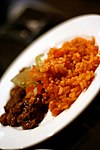|
Pico de gallo
  Pico de gallo (Spanish pronunciation: [ˈpiko ðe ˈɣaʝo], lit. 'rooster's beak'), also called salsa fresca ('fresh sauce'), salsa bandera ('flag sauce'), and salsa cruda ('raw sauce'), is a type of salsa commonly used in Mexican cuisine. It is traditionally made from chopped tomato, onion, and serrano peppers (jalapeños or habaneros may be used as alternatives), with salt, lime juice, and cilantro. Pico de gallo can be used in much the same way as Mexican liquid salsas. Because it contains less liquid, it also can be used as a main ingredient in dishes such as tacos and fajitas. The tomato-based variety is widely known as salsa picada ('minced/chopped sauce'). In Mexico it is normally called salsa mexicana ('Mexican sauce'). Because the colors of the red tomato, white onion, and green chili and cilantro are reminiscent of the colors of the Mexican flag, it is also called salsa bandera ('flag sauce'). In many regions of Mexico the term pico de gallo describes any of a variety of salads (including fruit salads), salsa, or fillings made with tomato, tomatillo, avocado, orange, jícama, cucumber, papaya, or mild chilis. The ingredients are tossed in lime juice and optionally with either hot sauce or chamoy, then sprinkled with a salty chili powder. EtymologyMany native residents of the Sonoran Mexico region explain that the salsa is thus named because the serrano pepper resembles a rooster's beak in shape.[1] According to food writer Sharon Tyler Herbst,[2] pico de gallo ("rooster's beak") is named thus because originally people ate it by pinching pieces between the thumb and forefinger. In their book Authentic Mexican: Regional Cooking from the Heart of Mexico, Rick Bayless and Deann Groen speculate that the name might allude to the bird-feed–like texture and appearance of the mince.[3] See also
References
External links
|












